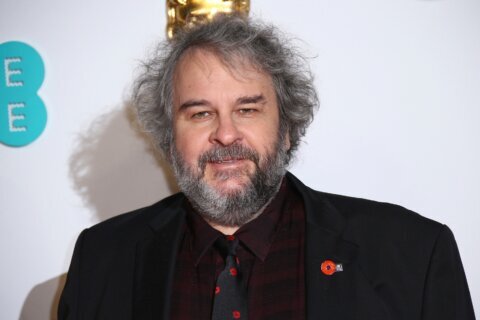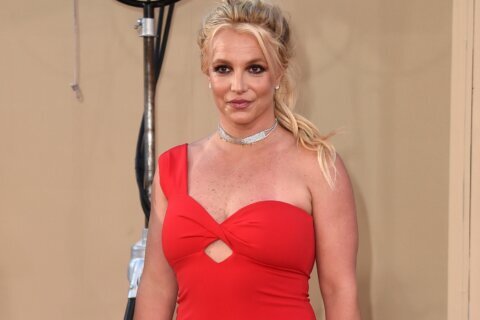This video is no longer available.
Hear our full chat on my podcast “Beyond the Fame with Jason Fraley.”
Most people don’t realize just how many hit songs that Phil Vassar has given country music.
Not only did he top the charts with his own big hits, he also wrote tons for other famous artists.
You can hear them all next week when Vassar plays The Birchmere in Alexandria, Virginia, on Friday, Oct. 20.
“If you’ve never been to The Birchmere, it’s one of the greatest places to see a show,” Vassar told WTOP. “It’s a real listening room, but it’s so fun, it’s not like it’s calm, people have a blast. … It’s very up close and personal. … It’s one of my favorite places to play, man. It’s very, very, very quaint and I love it. I get to see a lot of my friends there, a bunch of fraternity brothers are coming … It’s just going to be great. I’m excited about being back in Virginia.”
It’s a homecoming for Vassar, who was born in Lynchburg, Virginia, in 1962 and attended James Madison University in Harrisonburg, where he ran track and got his start playing piano in clubs around town.
“I just fell in love with the piano as a kid,” Vassar said. “I never really took lessons, I just learned how to play. I listened to a lot of Billy Joel, Elton John and [Bruce] Hornsby. When he came out with that first record it just blew my mind. He’s such a virtuoso guy, I’m meat and potatoes compared to guys like that. I loved The Commodores, I loved Lionel Richie and that was the first song I ever learned how to play … ‘Easy Like Sunday Morning.'”
After moving to Nashville, Vassar wrote countless hits, including Colin Raye’s “Little Red Rodeo,” Jo Dee Messina’s “Bye Bye” and “I’m Alright,” Tim McGraw’s “My Next Thirty Years” and “For a Little While,” Kenny Chesney’s “For the First Time” and Alan Jackson’s “Right on the Money,” winning ASCAP Songwriter of the Year in 1999.
Vassar described it as “a pretty amazing time.”
“That’s when I met Garth [Brooks], Tim [McGraw] and Alan [Jackson]. We were all trying to get deals,” he said. “Of course, when they all got their deals, it was more of a country thing going on. They were always like, ‘You’re a piano player, that’ll never work.’ I was like, ‘Ronnie Milsap had 40 No. 1 songs!’ Ray Charles [played country piano]. I loved ‘I Can’t Stop Loving You.'”
Eventually, he landed his own record deal for his self-titled debut album “Phil Vassar” (2002), including numerous radio hits with “Carlene,” “Six-Pack Summer” and “That’s When I Love You.” Of course, the album’s biggest hit was the No. 1 smash single “Just Another Day in Paradise,” which to this day remains his most recognizable tune.
“It’s so funny, one of my buddies goes, ‘Man, did you just write about your day that day?’ I was like, ‘Pretty much,'” Vassar said. “Kids screaming, phones ringing, it was just one thing after the next, it was real rapid fire and we just wrote it down. That was one of those songs that just catapulted me into the business. … ‘Carlene’ was a great intro, but when we had ‘Paradise,’ that went to No. 1 right away and it was just a big hit. You don’t write those every day.”
His second album “American Child” (2002) arrived after 9/11 with a patriotic title track that joined others like Brooks & Dunn’s “Only in America,” Alan Jackson’s “Where Were You Where the World Stopped Turning,” Toby Keith’s “Courtesy of the Red, White & Blue” and Aaron Tippin’s “Where the Stars and Stripes and the Eagle Fly.”
“We played at the (Twin) Towers right before all that happened,” Vassar said. “We were doing concerts every Friday in the square. They were setting up right at the foot of the towers (that Tuesday) and we just missed it. … That was a close call. We could have been right in the middle of that. That song came out of that. My grandfather was in World War II, my friends had grandfathers die in the war, so it was an homage to those guys … kind of a waltz.”
His third album “Shaken Not Stirred” (2004) kept the hits going with the party anthem “I’ll Take That as a Yes (The Hot Tub Song)” and the romantic No. 1 hit “In a Real Love” about putting in the hard work to build a lasting love.
“We were talking about high school and all those things — you grow up, all the stuff you go through, having kids, it’s such a journey,” Vassar said. “The process of putting that song together was just a lot of fun. It usually starts with a little groove or a hook, then you just start rattling off these lyrics, it’s almost like a rap. It doesn’t sound like one, but that’s kind of how you do it in sequence, you just put everything in step by step and you end up with a song.”
His “Greatest Hits” (2006) reminded folks of his success amid new songs like “Last Day of My Life,” followed by “Love is a Beautiful Thing” on his fourth studio album “Prayer of a Common Man” (2008). Since then, the last 15 years have brought “Traveling Circus” (2009), “Noel” (2011), “American Soul” (2016) and “Stripped Down” (2020), though such albums are known more to Vassar’s hard-core fans than mainstream country radio listeners.
“The business is cyclical,” Vassar said. “Every one in a while you’ll go, ‘What is that?’ But you gotta give people freedom to do what they do and create. I will never diss anybody. There’s some stuff I don’t want to listen to, but you’ve gotta give everybody credit for what they do and they’re trying to carry the torch their own way, just like we did. … Who’s the next generation? I’ll be interested to see what happens. I just hope it’s not all beer songs!”
Watch the full interview above or listen on my podcast “Beyond the Fame” below:








